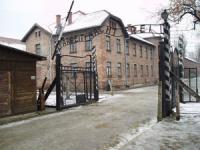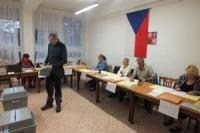-
Outcry over Poland’s law which rewrites WWII history, and bans challenges to the government’s version

Israeli Prime Minister Benjamin Netanyahu joined other Israeli leaders in harshly condemning a law initiated by Poland’s nationalist government and passed by the lower house of the Polish parliament. The law aims to distance Poland from any responsibility for or complicity in the Holocaust. At a Sunday cabinet meeting, Netanyahu said that Israel has “no tolerance for the distortion of the truth, the rewriting of history and the denial of the Holocaust.” Historians of twentieth-century Poland, as well as historians of the Second World War and the Holocaust, argue that the Polish government’s version of history is a willful distortion of a complicated and painful reality.
-
-
House bill will hold Putin, others accountable for election meddling
Representatives Ileana Ros-Lehtinen (R-Florida) and Brad Schneider (D-Illinois) introduced H.R. 4884, the Defending Elections from Threats by Establishing Redlines (DETER) Act, a House companion to S. 2313 which was introduced by U.S. Senators Chris Van Hollen (D-Maryland) and Marco Rubio (R-Florida) earlier this month. The DETER Act would impose sanctions against Russia should it meddle again and requests a presidential strategy for deterring future interference by China, Iran, North Korea, or any other foreign government.
-
-
British government’s new “anti-fake news” unit has been tried before – and it got out of hand
The decision to set up a new National Security Communications Unit to counter the growth of “fake news” is not the first time the UK government has devoted resources to exploit the defensive and offensive capabilities of information. A similar thing was tried in the Cold War era, with mixed results. Details of the new anti-fake news unit are vague, but may mark a return to Britain’s Cold War past and the work of the Foreign Office’s Information Research Department (IRD), which was set up in 1948 to counter Soviet propaganda. This secretive government body worked with politicians, journalists, and foreign governments to counter Soviet lies, through un-attributable “grey” propaganda and confidential briefings on “Communist themes.” IRD eventually expanded from this narrow anti-Soviet remit to protect British interests where they were likely “to be the object of hostile threats.” IRD’s rapid expansion from anti-communist unit to protecting Britain’s interests across the globe also shows that it’s hard to manage information campaigns. Moreover, government penny pinching on defense – a key issue in current debates – could also fail to match the resources at the disposal of the Russian state. In short, the lessons of IRD show that information work is not a quick fix. The British government could learn a lot by visiting the past.
-
-
Dutch intelligence instrumental in launching FBI’s investigation into U.S. election meddling
In 2014, Dutch government hackers from AIVD, the Dutch intelligence agency, managed to infiltrate “the computer network of the infamous Russian hacker group Cozy Bear,” a Dutch newspaper reports. A year later, the Dutch operatives witnessed “Russian hackers launching an attack on the Democratic Party in the United States.” The penetration of the Russian network allowed the Dutch intelligence services to provide the FBI with valuable information. The Steele Dossier was taken so seriously by the FBI not only because Christopher Steele was a credible and reliable Russia expert – but because much of the raw intelligence contained in the dossier dovetailed with information the FBI already had from other sources – one of them being Dutch intelligence.
-
-
Prosecuting background check, straw purchase violations depends on state laws
A new study found that prosecutions in Pennsylvania for violating the state’s straw purchase law increased by nearly 16 times following the 2012 passage of a law requiring a mandatory minimum five-year sentence for individuals convicted of multiple straw purchase violations. So-called straw purchases involve a prohibited person, such as someone with a criminal record, enlisting the aid of another person to buy the firearm on their behalf.
-
-
Climate stress puts nearly half of California's vegetation at risk
Current levels of greenhouse gas emissions are putting nearly half of California’s natural vegetation at risk from climate stress, with transformative implications for the state’s landscape and the people and animals that depend on it, according to a new study. Cutting emissions so that global temperatures increase by no more than 2 degrees Celsius (3.2 degrees Fahrenheit) could reduce those impacts by half, with about a quarter of the state’s natural vegetation affected.
-
-
Fake news kicks into high gear in Czech presidential runoff

Jiri Drahos, the pro-West, pro-EU challenger of incumbent Czech president Milos Zeman, came in second in the first round of the Czech presidential election, held 12-13 January. Zeman is one of Russian President Vladimir Putin’s strongest allies in central Europe, and the Russian government’s disinformation specialists have been ordered to help him win the runoff election, which will be held 27-28 January. These specialists have been successful in their social media efforts to boost the political strength of Marine Le Pen and her National Front in France; Geert Wilders and his Party of Freedom in the Netherlands; the Alternative für Deutschalnd (AfD) in Germany; Beppe Grillo and his Five Star movement in Italy; and increase the influence of other populist, ethno-nationalist movements such as Golden Dawn in Greece, Ataka in Bulgaria, and Jobbik in Hungary. They have also helped Donald Trump win the 2016 election. In the last two weeks, these disinformation experts have been targeting Drahos and his pro-West supporters.
-
-
Step-by-step horsepox study intensifies dual-use research debate
The publication last week of a research paper offering a manual for re-creating an orthopoxvirus has been harshly criticized by both scientists and biosecurity experts as reckless and dangerous. The research demonstrates the potential to recreate the virus that causes smallpox—one of the greatest scourges the world has ever faced and eradicated. “The risks posed by the publication of methods that could ease the pathway for synthesizing smallpox should have been carefully weighed from the outset,” says one expert. Analysts say that the publication further accentuates the need for urgent global dialogue to develop clear norms and actions for reducing biological risks posed by advances in technology. “As governmental oversight continues to lag behind biotechnology breakthroughs, academic and private stakeholders conducting, funding, and publishing research - as well as those developing new technologies – also must take responsibility for mitigating risk,” says the expert.
-
-
The synthesis of horsepox virus and the failure of dual-use research oversight
On 19 January 2018, the open access scientific journal PLOS One published an article that describes the de novo synthesis of horsepox virus, the first ever synthesis of a member of the orthopoxvirus family of viruses that includes the variola virus that causes smallpox. This research crosses a red line in the field of biosecurity. Given the high degree of homology between orthopoxviruses, the techniques described in this article are directly applicable to the recreation of variola virus. The synthesis of horsepox virus takes the world one step closer to the reemergence of smallpox as a threat to global health security. The reemergence of smallpox would be a global health disaster. Prior to its eradication, smallpox killed an estimated 300 million people, more people than all the wars of the twentieth century combined. Based on these considerations, the horsepox synthesis research is all risk and no reward. Given the known risks of this research for pioneering a technique that can be used to recreate variola virus and its questionable benefits, the publication of this article represents a failure of PLOS One to exercise its responsibility to carefully consider the biosecurity implications of the research it publishes.
-
-
So what did we learn? Looking back on four years of Russia’s cyber-enabled “Active Measures”
Americans continue to investigate, deliberate, and wallow in the aftermath of Russia’s rebirth of “Active Measures” designed to defeat their adversaries through the “force of politics rather than the politics of force.” Kremlin interference in the 2016 U.S. presidential election represents not only the greatest Active Measures success in Russian history, but the swiftest and most pervasive influence effort in world history. Never has a country, in such a short period of time, disrupted the international order through the use of information as quickly and with such sustained effect as Russia has in the last four years. Russia achieved this victory by investing in capabilities where its adversaries have vulnerabilities — cyberspace and social media. Putin’s greatest success through the employment of cyber-enabled Active Measures comes not from winning any single election, but through the winning of sympathetic audiences around the world he can now push, pull, and cajole from within the borders of his adversaries. Much has been learned about Russia’s hackers and troll farms in the year since the 2016 presidential election, but there remain greater insights worth exploring from a strategic perspective when looking at the Kremlin’s pursuit of information warfare holistically.
-
-
Climate change will displace millions in coming decades. Nations should prepare now to help them
By the middle of this century, experts estimate that climate change is likely to displace between 150 and 300 million people. If this group formed a country, it would be the fourth-largest in the world, with a population nearly as large as that of the United States. Yet neither individual countries nor the global community are completely prepared to support a whole new class of “climate migrants.” The scale of this challenge is unlike anything humanity has ever faced. By midcentury, climate change is likely to uproot far more people than the Second World War, which displaced some 60 million across Europe, or the Partition of India, which affected approximately 15 million. The migration crisis that has gripped Europe since 2015 has involved something over one million refugees and migrants. It is daunting to envision much larger flows of people, but that is why the global community should start doing so now.
-
-
Climate change will displace millions of people. Where will they go?

The 1951 Refugee Convention defines a protected refugee as someone who leaves his or her home country due to racial, religious, or social persecution, or reasonable fear of such persecution. These refugees have the right to seek asylum and protection from participating members of the United Nations (though these countries are not obligated to take them in). However, people displaced by climate change do not fit this definition. At the international level, there is no legal mechanism in place to protect climate migrants’ rights and to ensure assistance from other countries. For climate relocation to work, governments need to care and commit to international responsibility and burden-sharing. However, in the current global political context of fear of terrorism, an increased refugee influx into Europe, and an overall rise of xenophobia, countries are more likely to opt for stricter policies on cross-border migration.
-
-
Draft U.S. document confirms Russian plans for “Doomsday” weapon
Some two years ago, Western intelligence and military experts scrambled to make sense of a strange new Russian weapon whose designs were glimpsed briefly in a mysterious report on Russian state TV. The weapon was a nuclear-capable underwater drone that would be launched from a submarine. The description accompanying a picture of the drone said such vehicles or weapons would be pilotless and capable of attacking enemies and creating “zones of extensive radioactive contamination unfit for military, economic or other activity for a long period of time.” Now, for the first time there are public indications that U.S. intelligence have not only confirmed Russian intentions for the weapon, but are also trying to figure out how to respond to it.
-
-
Early Trump support increased in areas with recent Latino population growth: Study
Donald Trump announced his presidential candidacy in June 2015 with a bold, double-edged promise: that he would build a “great wall” on the border separating the United States and Mexico, and that he would make Mexico pay for it. That polarizing statement, since repeated ad nauseam by commentators on both sides of the political spectrum, quickly went on to become one of the defining hallmarks of Trump’s presidential campaign. According to three political scientists from the University of California, Riverside, Trump’s remarks also galvanized his voter base in the initial stages of his campaign, particularly in areas that had experienced considerable Latino population growth in recent years.
-
-
Thorium reactors could dispose of large amounts of weapons-grade plutonium
Scientists are developing a technology enabling the construction of high-temperature, gas-cool, low-power reactors with thorium fuel. The scientists propose to burn weapons-grade plutonium in these units, converting it into power and thermal energy. Thermal energy generated at thorium reactors may be used in hydrogen industrial production. The technology also makes it possible to desalinate water.
-
More headlines
The long view
Preventing Another 'Jan. 6' Starts by Changing How Elections Are Certified, Experts Say
The 2024 presidential election may be a rematch between President Joe Biden and former President Donald Trump, but preventing a repeat of Jan. 6, 2021 — when false claims of a stolen election promoted by Donald Trump and his allies led to an insurrection at the U.S. Capitol —will be top of mind this election year. Research finds broad support among public for nonpartisan certification commissions.
States Rush to Combat AI Threat to Elections
This year’s presidential election will be the first since generative AI became widely available. That’s raising fears that millions of voters could be deceived by a barrage of political deepfakes. Congress has done little to address the issue, but states are moving aggressively to respond — though questions remain about how effective any new measures to combat AI-created disinformation will be.
Chinese Government Hackers Targeted Critics of China, U.S. Businesses and Politicians
An indictment was unsealed Monday charging seven nationals of the People’s Republic of China (PRC) with conspiracy to commit computer intrusions and conspiracy to commit wire fraud for their involvement in a PRC-based hacking group that spent approximately 14 years targeting U.S. and foreign critics, businesses, and political officials in furtherance of the PRC’s economic espionage and foreign intelligence objectives.
European Arms Imports Nearly Double, U.S. and French Exports Rise, and Russian Exports Fall Sharply
States in Europe almost doubled their imports of major arms (+94 per cent) between 2014–18 and 2019–23. The United States increased its arms exports by 17 per cent between 2014–18 and 2019–23, while Russia’s arms exports halved. Russia was for the first time the third largest arms exporter, falling just behind France.
LNG Exports Have Had No Impact on Domestic Energy Costs: Analysis
U.S. liquified natural gas (LNG) exports have not had any sustained and significant direct impact on U.S. natural gas prices and have, in fact, spurred production and productivity gains, which contribute to downward pressure on domestic prices.
